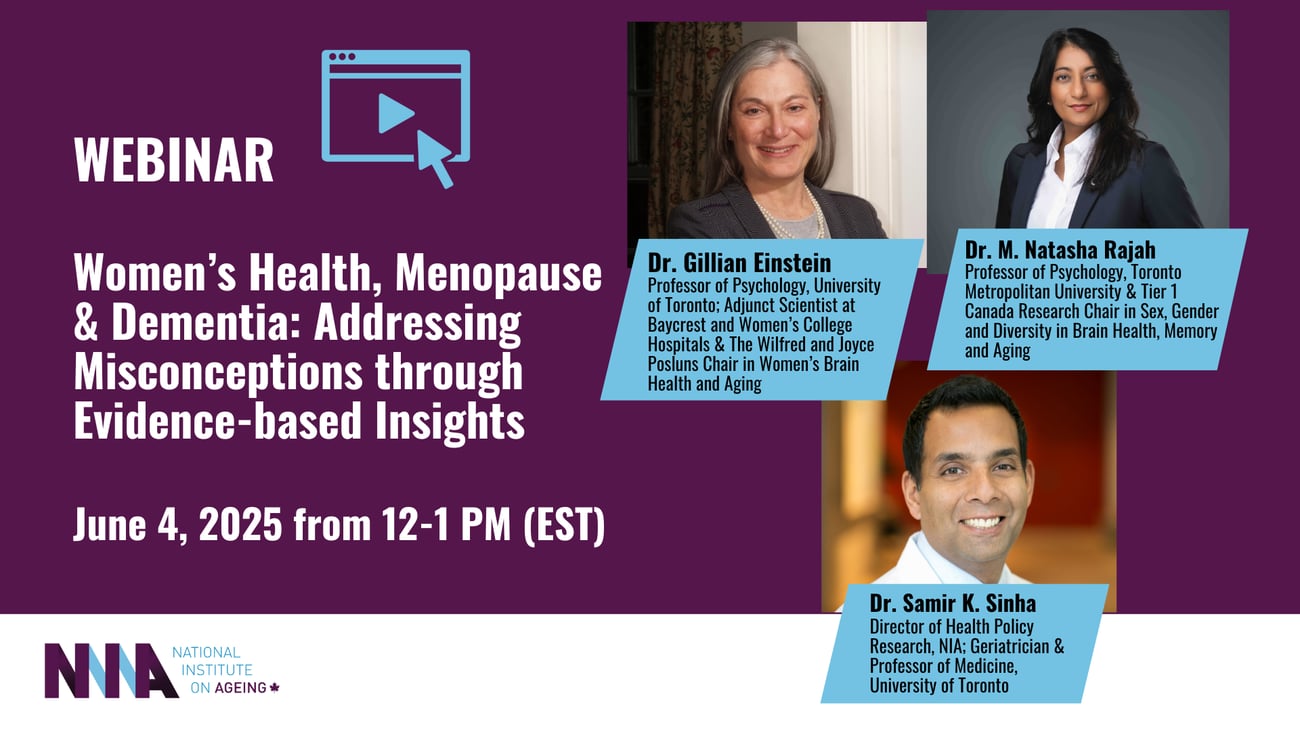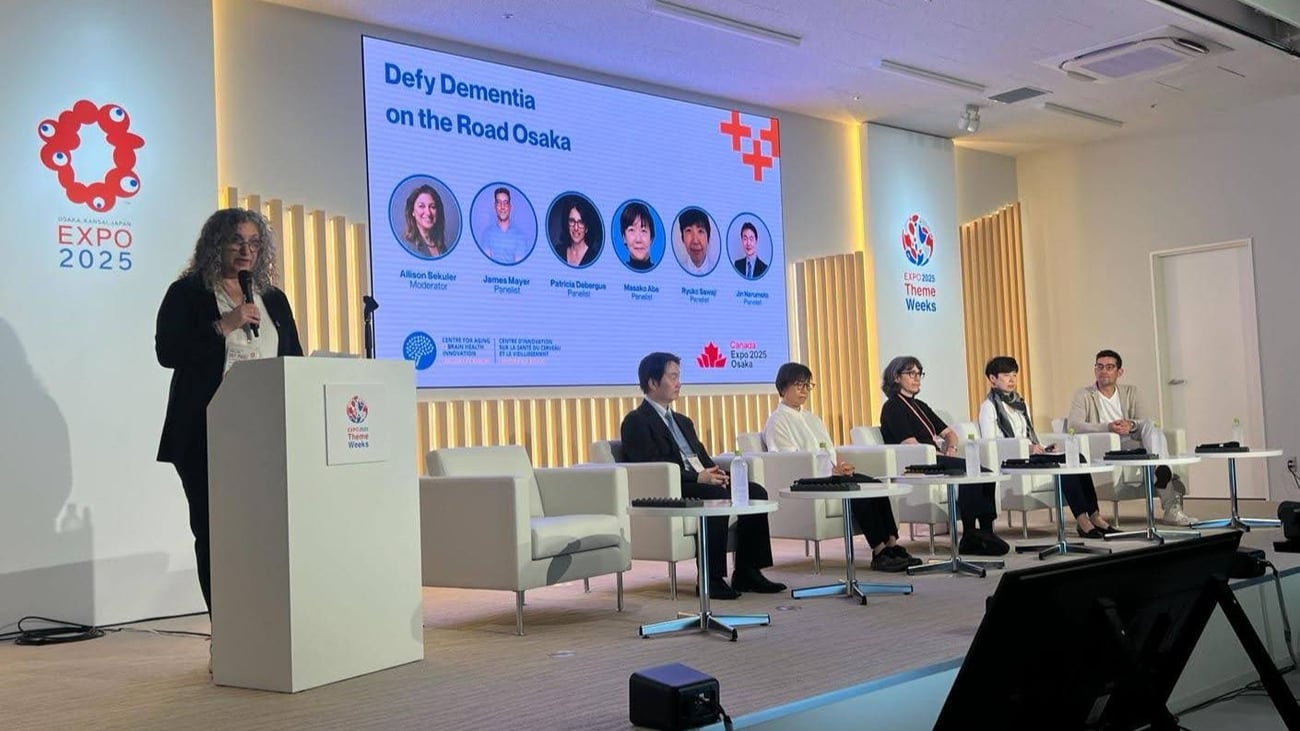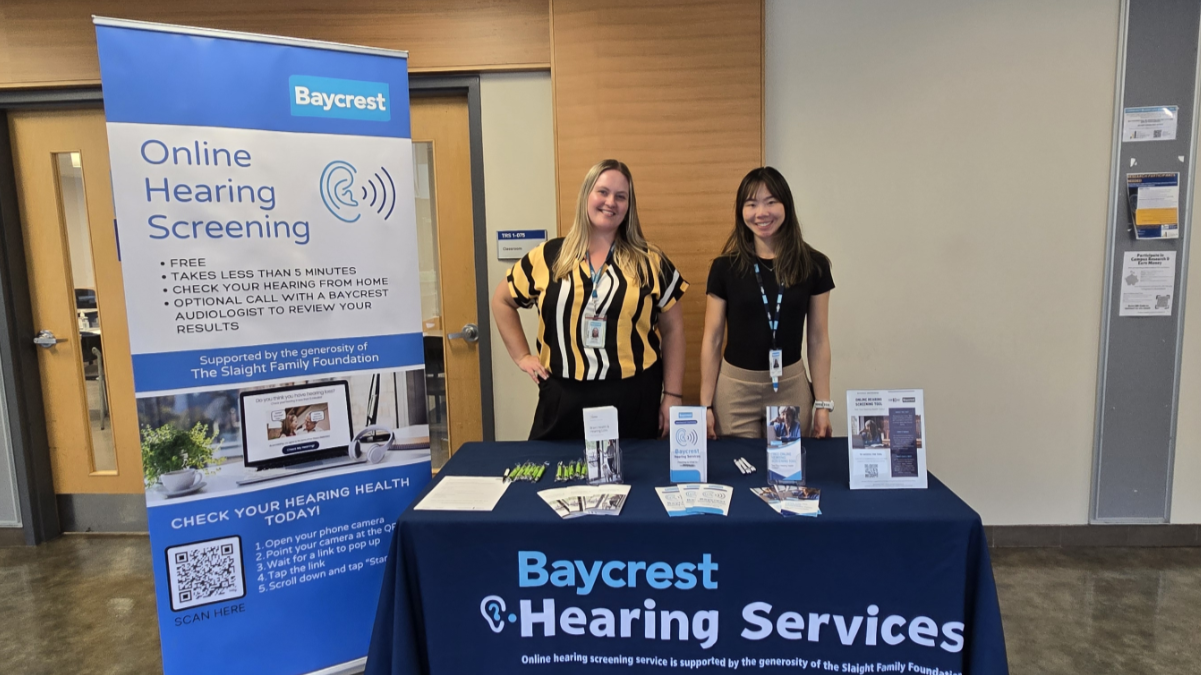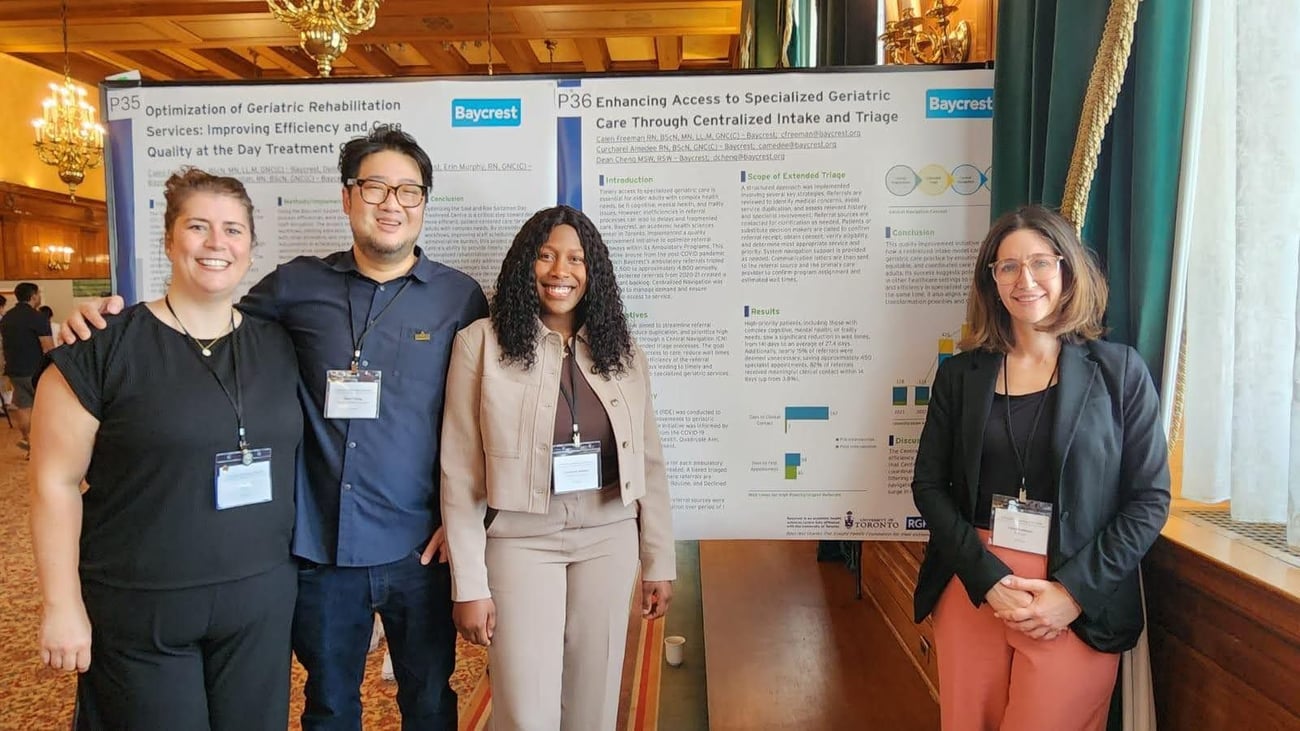Welcome to the second edition of the Slaight Family Foundation Dementia Initiative Newsletter.
This issue is packed with inspiring stories and impactful updates from across the country. From behind-the-scenes of our upcoming public education campaign on dementia prevention to on-the-ground innovations in long-term care and community supports, you'll see how partner organizations are advancing real change—and reshaping how we care for people living with dementia.
Inside, you’ll find:
A sneak peek at our September public education campaign on dementia, challenging the idea that dementia is an inevitable part of ageing
Highlights from across the seven Slaight-funded partners, including new tools for caregivers, expanded culturally inclusive programming and tech-enabled models of care
Updates on community-led brain health initiatives, affirming care for gender-diverse older adults and the next phase of groundbreaking dementia research
We’re proud to share these snapshots of progress—and to amplify the voices, solutions and partnerships driving a more equitable, person-centred future for dementia care in Canada.
|
|
|
Coming This September: A New Public Education Campaign on Dementia Prevention
We’re launching a bold new national campaign—and it’s grounded in lived experience. Here’s a sneak peek from our video shoot.
|
 |
Thank you for sharing your stories
A sincere thank you to everyone who answered our casting call for the NIA’s upcoming public education campaign. Whether you're living with dementia, caring for a loved one, or simply passionate about prevention, we’re deeply grateful you shared your stories, strength and insights.
Your voices are helping us reshape how Canadians think about dementia—and about what it means to age well.
|

|
In Case You Missed It: “Women’s Health, Menopause & Dementia: Addressing Misconceptions through Evidence-based Insights” NIA Webinar
Watch or rewatch the third event in our NIA dementia webinar series featuring women’s brain health experts Dr. M. Natasha Rajah and Dr. Gillian Einstein, moderated by Dr Samir Sinha.
Dr. Rajah is a Professor & Tier 1 Canada Research Chair in the Department of Psychology, Toronto Metropolitan University (TMU) and Adjunct Scientist at Rotman Research Institute, Baycrest. Dr. Einstein is the Wilfred and Joyce Posluns Chair in Women’s Brain Health and Aging, Professor of Psychology at the University of Toronto, Adjunct Scientist at Baycrest and Women’s College Hospitals and Honorary Doctor of Medicine, Linköping University, Sweden. In this webinar, Dr. Rajah and Dr. Einstein discuss research on key topics in women’s brain health, including what we know about biological sex differences and the relationship between menopause and brain health, including dementia.
|
| WATCH HERE
|
|
|
|
Baycrest: Transforming Dementia Prevention and Care Across Canada
Thanks to the Slaight Family Foundation’s ongoing support, Baycrest is advancing groundbreaking work to reduce dementia risk, empower caregivers and build a more inclusive, accessible brain health system.
The Kimel Family Centre for Brain Health and Wellness: Scaling Personalized Prevention
The world’s first research-driven community centre is expanding its reach and impact. Every member begins with a comprehensive personal assessment to determine their dementia risk—considering genetics, health conditions, lifestyle and environmental factors. Based on this profile, they are matched with tailored programs to help reduce risk, improve cognition and support overall health.
Growing Membership and Support
Over 450 people are now enrolled, well on track to reach the 600-member goal by year-end
This growth enabled Baycrest to expand staff, including a second Senior Research Coordinator, a research assistant and a part-time volunteer coordinator to support the Centre’s vibrant community
Expanded Programming
Thanks to Slaight funding, Baycrest increased the number of offered programs to 229 this term—up from 157 last year
Evening and Sunday programming is being introduced to support working adults
Engaging Diverse and Underserved Communities
Baycrest has launched a recruitment plan for five Community Champions from underrepresented groups in North York, including Filipino, Chinese, South Asian, Italian and Black communities. A sixth Champion from the 2SLGBTQI community is joining through a new partnership with Egale Canada.
Materials were co-developed and translated with input from community leaders, ensuring cultural relevance and accessibility
In collaboration with Toronto Seniors Housing and Sunnybrook Health Sciences Centre, Baycrest is reaching low-income older adults with free transportation, Presto tickets and onsite support
Promising Early Outcomes
After six months, participants are showing reduced dementia risk and improved cognition
Many report feeling less lonely, less stressed, more active and more hopeful about ageing
Defy Dementia: Raising Awareness and Reducing Stigma
|
 |
This campaign continues to inform and inspire people around the world through its Webby-nominated podcast, Canuckle Brain Health game and national events.
|
|
|
Recent Events
Upcoming Events
|
|
|
C-CART for Dementia Caregivers
The Canadian Caregiver Assessment and Resource Tool (C-CART™) is evolving into a specialized version for dementia caregivers. This free online tool will help families assess their needs and access tailored support across Canada.
Year One Achievements
Co-developed a dementia-specific question set with caregivers and experts
Organized and categorized relevant caregiver resources
Engaged stakeholders to shape educational content
Built a secure, bilingual technical platform to support rollout
Caregiver Voices
“It’s a relief to see something being built that actually reflects what we go through every day.”
“I hope this makes it easier for others to find real help faster.”
Baycrest Online Hearing Screening Tool
|
 |
Hearing loss is a modifiable dementia risk factor, but remains widely untreated. Baycrest’s free online hearing screening tool—requiring only headphones and a device—helps people take early steps toward better hearing and brain health.
To identify hearing loss earlier, the Baycrest Online Hearing Screening Tool is available to anyone for free, and it takes less than 5 minutes to get an idea of hearing status. All you need is:
- A device (i.e. smartphone, tablet, computer, etc.)
- Headphones
- Internet connection
You get an estimate of your hearing status and have the option to connect with a Baycrest audiologist for a free 15-minute phone consult, improving access to hearing healthcare and addressing hearing loss as a risk factor dementia.
Caregiver Voices
Featured at key events, including the Canadian Academy of Audiology Conference
Upcoming presentations: Alzheimer’s Association International Conference (AAIC) and Grace Life Center virtual session
Transforming Dementia Navigation Through Central Navigation Service (CNS)
|
 |
Baycrest’s Central Navigation Service is making it easier for people living with dementia and their families to access coordinated care.
Impact to Date 13% growth in reach in one year
Integration of the Toronto Behaviour Support Coordinating Office streamlined operations and improved referral times
Community-based navigation support provided to nearly 100 Toronto Seniors Housing residents
Presented at the CGNA2025 National Conference in Winnipeg
Together, these programs are improving lives, advancing knowledge and building a more equitable and effective dementia care ecosystem in Canada.
|
|
|
|
|
|
Belmont House: A Home Where People Living With Dementia Can Truly Be Themselves |
|
|
Belmont House is well on its way to fully implementing the "Butterfly" approach throughout the home. Three of its home areas are nearing completion—one is already fully accredited by
Meaningful Care Matters, another is about to be accredited and the third is actively progressing toward full implementation. The transformation of another home area is set to begin in September.
This journey has been both exciting and fulfilling for team members. They have observed a noticeable increase in personal engagement between residents and staff, along with more excitement and spontaneity in daily life. Team members and residents are now baking bread, cooking bacon and flipping grilled cheese sandwiches together at lunchtime. People living in the home are truly "free to be themselves," and the atmosphere is increasingly beginning to feel like a real home.
|
|
|
|
|
CAMH: Advancing Tech-Enabled Dementia Care in Long-Term
Care Homes
|
|
|
The Centre for Addiction and Mental Health (CAMH) is leading innovation in dementia care through the Technology-Enabled Integrated Care Pathway (Tech-ICP). This new
model helps long-term care (LTC) staff respond earlier and more effectively to behavioural symptoms of dementia. These symptoms include agitation, aggression and restlessness, which often cause significant distress and can result in unnecessary hospital transfers or overmedication.
With support from the Slaight Family Foundation and additional funding from the Ontario Ministry of Health, Tech-ICP brings together digital tools, structured care protocols and focused staff training. The model helps LTC teams identify and manage behavioural and psychological symptoms of dementia using proactive, person-centred approaches. The ultimate goal is to improve resident quality of life while reducing medication use and caregiver burden.
|
|
|
|
|
Building a Scalable Model of Care
Over the past year, the CAMH team has:
Finalized care protocols focused on behavioural assessment, non-pharmacological strategies and medication review
Developed site-specific onboarding and implementation plans for over 20 LTC homes
Secured key technology assets, including wearable monitoring devices and virtual reality tools for caregiver education
Established partnerships with organizations such as PIECES Canada, Behavioural Supports Ontario, the Alzheimer Society of Canada and PointClickCare
Created readiness assessment tools and standardized training materials for staff across diverse care settings
These efforts have laid the groundwork for a randomized controlled trial starting in late 2025, which will evaluate the model’s impact on care quality, staff confidence, medication practices and resident outcomes.
Looking Ahead
In the coming year, Tech-ICP will move into full implementation across currently engaged LTC sites. The project will also expand to include additional homes in different geographic regions. Key priorities include:
Strengthening data collection and outcome monitoring
Supporting site-level fidelity through tailored coaching and documentation tools
Promoting shared learning across LTC homes through knowledge exchange forums
Completing a Manual of Operations to support long-term use of the model beyond the initial implementation phase
Tech-ICP is paving the way for a new standard in dementia care. By equipping LTC teams with practical tools and training, the initiative supports early intervention, reduces crisis responses and centres the dignity and safety of residents.
|
|
|
|
Egale Canada: Championing Inclusive Dementia Support Through Partnerships and Storytelling
|
|
|
Egale Canada continues to lead the way in advocating for identity-affirming, inclusive dementia care through powerful partnerships and community-driven initiatives. In collaboration with the Alzheimer Society of
Ontario, Egale hosted the Help Us Remain webinar, spotlighting the unique challenges faced by 2SLGBTQI individuals living with dementia and introducing support resources like the FirstLink program.
Egale also consulted with Baycrest on a special Pride episode of the Defy Dementia podcast, Living with Pride in the Face of Dementia. The episode features moving stories and expert insights from advocates like Susan Gapka and Dr. Samir Sinha, emphasizing the urgent need for culturally competent care and support systems for 2SLGBTQI communities.
Help build a more inclusive future for dementia care. Watch the webinar, listen to the podcast and share these resources with your networks. Together, we can ensure dignity, respect and support for all.
Read more:
|
|
|
|
|
Sunnybrook: Building Brain Health and Breaking Barriers
Through generous contributions from the Slaight Family Foundation, Sunnybrook continues to strengthen partnerships across hospital and community organizations to optimize dementia care across the continuum.
Sunnybrook’s Brain Health Project supports tenants of four Toronto Seniors Housing buildings by delivering timely, person-centred care when it matters most. By combining the expertise of community organizations like SPRINT Senior Care, primary care physicians from the Sunnybrook Academic Family Health Team and specialist services such as Community Psychiatric Services for the Elderly (CPSE), the team has developed care pathways that span from prevention and early intervention to support for those living with advanced dementia.
The frontline team now includes recreation therapy staff, nurses, primary care physicians and an occupational therapist. This interdisciplinary approach focuses on engaging tenants in social and recreational brain health programs as a bridge to other health and social services they may need.
Most recently, the team completed training to implement MINT Memory Clinics in the four supported housing buildings. These clinics will be staffed by clinicians from SPRINT Senior Care and Sunnybrook Health Sciences Centre, improving access to personalized diagnostic and care planning services for individuals living with cognitive impairment. The Alzheimer Society of Toronto is also providing support and expertise to individuals and care partners throughout their care journeys. The first clinic is set to launch this month.
Sunnybrook is also partnering with Baycrest to offer free memberships to Toronto seniors housing residents.
Sunnybrook’s Year 1 Impact:
100+ Toronto Seniors Housing Corporation tenants supported by new programming
12 team members working across seven disciplines
Programming now delivered onsite in four TSHC buildings for improved access to care
In collaboration with our Slaight Brain Health partners, co-developed three dementia care pathways for identifying and supporting at-risk tenants sooner
Client Story: RK
RK is an independent, passionate community advocate living in one of the supported buildings. Following several challenging experiences with her health and family, she began to feel overwhelmed and noticed that her mind was “slipping.”
Through the work of SPRINT Senior Care, which provides personal support worker services in the building, RK was connected with a building physician from Sunnybrook Health Sciences Centre. She was then introduced to the Brain Health Project’s recreation therapist, with whom she developed a strong rapport. Together, they focused on her goals of rebuilding self-esteem and becoming more connected with her community.
Today, RK is leading social programs in her building and has accessed additional mental health supports through her continued engagement with the team. She has shared that the Brain Health Program has given her “a new view on life,” and she looks forward to continuing to serve her community.
|
|
|
|
|